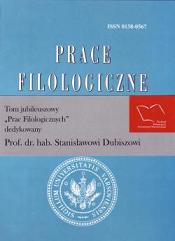O dalszych losach niektórych neologizmów słowotwórczych
On Further Usage of Certain Word-Formative Neologisms
Author(s): Iwona BurkackaSubject(s): Language and Literature Studies
Published by: Wydział Polonistyki Uniwersytetu Warszawskiego
Keywords: leksykologia; słowotwórstwo; słownictwo; neologizmy słowotwórcze; lexicology; word-formation; vocabulary; word-formative neologisms
Summary/Abstract: Word-formative neologisms are created as a result of various naming and expressive needs. Their further usage, described at the moment of their creation or shortly afterwards, is difficult to predict. Some of the neologisms remain occasionalism or elements of the varieties of Polish, others enter the contemporary lexical stock permanently or relatively permanently. Their novelty, often connected with formal inflection (e.g. the new type of the base form in compounds with the segments {-holik} or {e-}), as well as the fact that they are unstable in the system, frequently bring about problems with their lexicographical description. This is visible especially in the stylistic characteristics of these words. The others are elements of open classes. They can be and they are completed with new structures created by analogy, e.g. the names with the segment -mat (separated from the word {automat}) − {biletomat, infomat} or compounds with the morphemes {-mania} − {telewizjomania, zakupomania, wideomania, serialomania} or {auto-} meaning ‘connected with the car, of the car’ − {autogiełda, automyjnia, autoserwis}.
Journal: Prace Filologiczne
- Issue Year: 2007
- Issue No: 53
- Page Range: 49-56
- Page Count: 8
- Language: Polish

